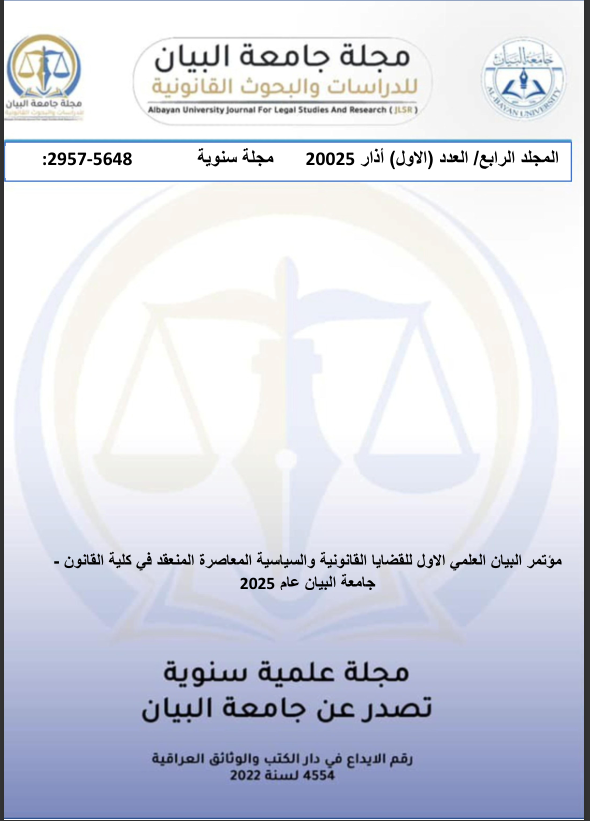Protecting and guaranteeing the rights of women and children in legal legislation and their role in stabilizing society
DOI:
https://doi.org/10.65263/m5yexj37Keywords:
family - rights - protection - law - violence.Abstract
With the increasing calls to protect the rights of women and children within the family from domestic violence to which they may be exposed. In an effort to preserve the family, legal legislation protects the entity and members of the family while defining the rights of each individual in a clear manner and prevents any assault or transgression on these rights, whether the infringement is directed at the wife or children.
This study will shed light on the concept of family and the rights of the wife and children after the establishment of the family within the sacred social contract which is marriage. The obligations of the spouses towards each other or towards the children as well as the duty of society towards the family to preserve it and prevent any aggression against it and then define the meaning of violence directed at the family whether towards the wife or towards the children. Because it represents a reason for the collapse of the family and society at the same time, and in return, we will discuss the specific legal texts for crimes against the family and its rights and the legal protection of these rights in each of the legal legislations in force, including the Personal Status Law No. 188 of 1959, Civil Law No. 40 of 1951, Penal Law No. 111 of 1969, and Juvenile Law No. 76 of 1983, with the help of what was stated in the draft law regarding violence against women voted on in the Kurdistan region of Iraq in 2011 and presented before the Iraqi Council of Representatives for a vote. The study explains the extent of the impact of these legislations on preserving and protecting the family entity, its rights and eliminating domestic violence. From another perspective, how these calls have led to an increase in divorce cases, the harm to the family entity, the achievement of material gains for women, and the loss of the child between the divorced mother and the divorced father and then come up with a conclusion of the most important results and recommendations.
References
Koran
1 - Abu Bakr Ahmed bin Ali Al-Razi Al-Jassas, Ahkam Al-Qur’an, Dar Al-Kutub Al-Ilmiyyah, Beirut, 1st edition, 1415 AH - 1994 AD.
2 - Hassan bin Yusuf bin Ali bin Mutahhar Al-Hilli, Tadhkirat al-Fuqaha’, Razavi Library for the Revival of Jaafari Antiquities, Mashhad.
3 - Sayed Sabiq, Jurisprudence of the Sunnah, Dar Revival of Arab Heritage, Beirut, 3rd edition, 1397 AH - 1977 AD.
4 - Salah al-Din Maqbool Ahmed, Women between the guidance of Islam and the temptation of the media, Elaph International Publishing House, Kuwait, 1st edition, 1418 AH - 1997 AD.
5 - Othman Al-Takrouri, Explanation of the Personal Status Law, Dar Al-Thaqafa for Publishing, Amman, 1st edition, 2009 AD.
6 - Ali Abdul Aziz Al-Jubouri, Financial Rights of Spouses, Al-Sahifa Al-Arabiya House, Baghdad, 1st edition, 2021 AD.
7- Fadel Al-Saffar, Family Jurisprudence, Allama Ibn Fahd Al-Hilli Library, Karbala, 3rd edition, 1437 AH - 2016 AD.
8- Fadel Al-Hindi, Uncovering the Rules of Rulings, Al-Nash Al-Islami Foundation, Qom, 2nd edition, 1422 AH.
9- Fakhr al-Din al-Tarihi, Bahrain Complex, edited by Ahmed al-Hassani, Al-Wafa Foundation, Beirut, 1st edition, 1412 AH - 1991 AD.
10- Mohib al-Din al-Tabari, Jami` al-Bayan fi Tafsir al-Qur’an, Dar al-Hadith, Beirut, 2010 AD.
11- Muhammad Al-Hussein Kashif Al-Ghita, Editorial of the Magazine, Al-Najah Library, Tehran, 1st edition, (no. ed.).
12- Muhammad al-Rishahri, Mizan al-Hikma, Dar al-Hadith, Qom, 1st edition, 1416 AH.
13- Muhammad bin Al-Hasan Al-Hurr Al-Amili, Shiite Means to Shiite Attainment, Arab Heritage Revival House, Beirut, (no. ed.).
14- Muhammad bin Ali Al-Shawkani, Nail Al-Awtar from the Hadiths of Sayyid Al-Akhyar, Dar Al-Jeel, Beirut, 1973 AD.
15- Muhammad bin Ali bin Al-Hussein Al-Saduq, Man La Yahdrahu Al-Faqih, Jama’at Al-Muddassin fi Hawzah of Qom, Qom, 2nd edition, 1404 AH.
16- Muhammad bin Yaqoub Al-Fayrouzabadi, Al-Qamoos Al-Muhit, Dar Al-Hadith, Cairo, 2013 AD.
17- Muhammad Hassan al-Najafi, Jawahir al-Kalam fi Sharh Sha’i’ al-Islam, edited by Mahmoud al-Qughani, Dar Ihya’ al-Tarath al-Arabi, Beirut, 7th edition, 1981 AD.
18 - Muhammad Hassan Kashkul, Explanation of the Personal Status Law No. 188 of 1959 and its amendments, The Legal Library, Baghdad, (No. T).
19- Muslim bin Al-Hajjaj Al-Naysaburi, Al-Jami’ Al-Sahih, Dar Al-Fikr, Beirut, (no. T).
20- Mustafa Al-Zalmi, Introduction to the Study of Islamic Sharia, Legal Library, Baghdad, 2009 AD.
21- Youssef Al-Bahrani, Al-Hadeek Al-Nadhirah fi Ahkam Al-Atra Al-Tahirih, Islamic Publishing Foundation, Qom, (No. T).
Laws.
1- The Personal Status Law in force in the Kurdistan Region.
2- Personal Status Law No. (188) of 1959
3- Penal Code No. (111) of 1969.
4- Labor and Social Security Law No. (37) of 2015.
5- Juvenile Welfare Law No. (76) of 1983.
6- Law on the Care of Minors No. 78 of 1980.
7- Law against Domestic Violence No. (8) of 2011.
8- Moroccan Family Code No. 70.03 of 2004.
9- Project to combat domestic violence.
10- Child protection draft law.
Agreements
1- The Convention on the Elimination of All Forms of Discrimination against Women (CEDAW).
2- The Convention for the Protection of the Rights of the Child
3- The International Covenant on Civil and Political Rights adopted by the United Nations General Assembly and ratified in 1976.
Downloads
Published
Issue
Section
License
The authors retain Full copyright of their published article
Al-Bayan University Journal for Legal Studies and Research (AUJLSR) applies the Creative Commons Attribution 4.0 International (CC BY 4.0) License to articles and other works we publish. If you submit your paper for publication by AUJLSR, you agree to have the CC BY 4.0 license applied to your work.
Articles can be read and shared for under the following conditions:
BY: Attribution must be given to the original source (Attribution)
Full details available at
https://creativecommons.org/licenses/by/4.0/



